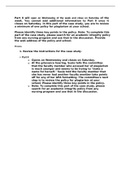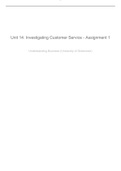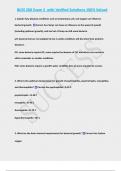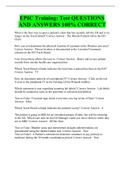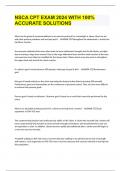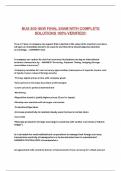Responsibility
Summary
Rania El Ghalbzouri 1
IBT 3 2024-2025
,Chapter 1: Introduction
10 Companies called out for Greenwashing
Greenwashing refers to deceptive marketing practices where companies falsely present
themselves as environmentally friendly. This misleads consumers and undermines
efforts to address environmental issues. Below are 10 companies criticized for
greenwashing:
1. Volkswagen: The company falsely marketed its vehicles as eco-friendly while
secretly using software to cheat emissions tests, allowing engines to emit up to 40
times the legal limit of pollutants.
2. BP: Despite rebranding as "Beyond Petroleum" and promoting solar panels, BP
spends over 96% of its budget on oil and gas, misleading the public about its
commitment to renewable energy.
3. ExxonMobil: After causing the largest oil spill in US history, ExxonMobil continues to
promote algae biofuels as a solution to transport emissions while lacking a
comprehensive strategy to reduce its overall emissions.
4. Nestlé: While claiming it would make its packaging 100% recyclable by 2025, Nestlé
faced criticism for vague targets and continued plastic pollution, ranking among the
top plastic polluters globally.
5. Coca-Cola: Despite committing to recycling and reducing plastic waste, Coca-Cola
remains the world’s largest plastic polluter and was sued for false claims about its
sustainability efforts.
6. Starbucks: Starbucks introduced a "straw-less lid" to promote sustainability, but it
used more plastic than the previous combination, raising concerns about recycling
rates.
7. IKEA: Although initially praised for its sustainability, IKEA was linked to illegal logging
practices and criticized for demolishing an existing sustainable store to build a new
one.
8. Plastic Water Bottles: Brands like Poland Spring, Evian, and Deer Park promote
their water as "natural," but contribute to the global plastic waste crisis by relying on
single-use plastic bottles.
9. Major Banks: Banks like JPMorgan, Citibank, and Bank of America have marketed
green investment opportunities while continuing to fund industries that harm the
environment, such as fossil fuels and deforestation.
Rania El Ghalbzouri 2
IBT 3 2024-2025
, 10. Fast Fashion: Companies like H&M, Zara, and Uniqlo have been accused of
greenwashing with their "sustainable" clothing lines, which are criticized for having
minimal environmental benefits and promoting environmentally harmful fast
fashion practices.
These examples highlight the importance of holding companies accountable for their
environmental claims. Greenwashing not only misleads consumers but also hampers
real progress towards sustainability.
Top 10 Companies Leading in Corporate Social Responsibility (CSR)
Corporate Social Responsibility (CSR) has evolved from a corporate trend to a key
business strategy. Companies are now integrating social, environmental, and ethical
considerations alongside financial goals. This shift reflects an increasing awareness of
the interconnectedness between business practices and their impact on society, the
environment, and employee satisfaction. Below are ten companies recognized for their
leadership in CSR:
1. Microsoft: Microsoft promotes employee volunteering and offers initiatives like 'Tech
for Social Impact' and 'AI for Accessibility,' using technology to address societal
challenges such as education, healthcare, and disability support.
2. Patagonia: Known for its environmental activism, Patagonia supports grassroots
organizations, commits 1% of sales to environmental causes, and advocates for
climate change awareness and public land preservation.
3. Salesforce: Salesforce follows the '1-1-1 model,' donating 1% of equity, time, and
product to charitable causes. The company emphasizes diversity, equity, and
inclusion (DEI) and encourages employee volunteerism through its 'Volunteer Time
Off' program.
4. Starbucks: Starbucks champions ethical sourcing with its 'C.A.F.E.' program, which
supports coffee farmers and promotes sustainable agriculture. The company also
has ambitious sustainability goals, aiming to reduce waste production by 50% by
2030.
5. Citrix: Citrix focuses on inclusivity and sustainability, using its digital solutions to
support societal challenges. It encourages employee community engagement and
integrates CSR into its operations for social impact.
6. Cisco: Cisco advances digital inclusion through its 'Cisco Networking Academy,'
providing IT education and career pathways. Its 'Global Problem Solvers' program
leverages technology for social good, helping bridge the digital divide.
Rania El Ghalbzouri 3
IBT 3 2024-2025
, 7. Unilever: Unilever’s Sustainable Living Plan addresses environmental and social
challenges. The company promotes eco-friendly products, reduces its environmental
footprint, and innovates packaging to minimize waste.
8. Tesla: Tesla is committed to sustainability with its electric vehicles and solar energy
products, aiming to reduce fossil fuel dependence. The company also focuses on
energy efficiency and renewable energy solutions.
9. IBM: IBM utilizes its expertise to tackle global societal issues through initiatives like
the 'Corporate Service Corps' and 'Call for Code,' which encourage employees to
create technology solutions for disaster preparedness and humanitarian challenges.
10. Google: Google is a leader in sustainability, aiming for 24/7 carbon-free energy by
2030. It has been carbon-neutral since 2007 and invests in renewable energy while
using its philanthropic arm, Google.org, to support global social enterprises.
Emerging Trends in CSR Employee engagement in CSR, especially through volunteering
programs, is becoming increasingly important. These initiatives not only contribute to
social good but also enhance workplace culture, employee satisfaction, and brand
reputation. Companies that prioritize CSR attract skilled talent, improve productivity, and
strengthen customer relationships.
In conclusion, these companies showcase how integrating CSR into business operations
can drive positive change, benefiting both stakeholders and society while promoting a
more sustainable and equitable world.
Rania El Ghalbzouri 4
IBT 3 2024-2025


